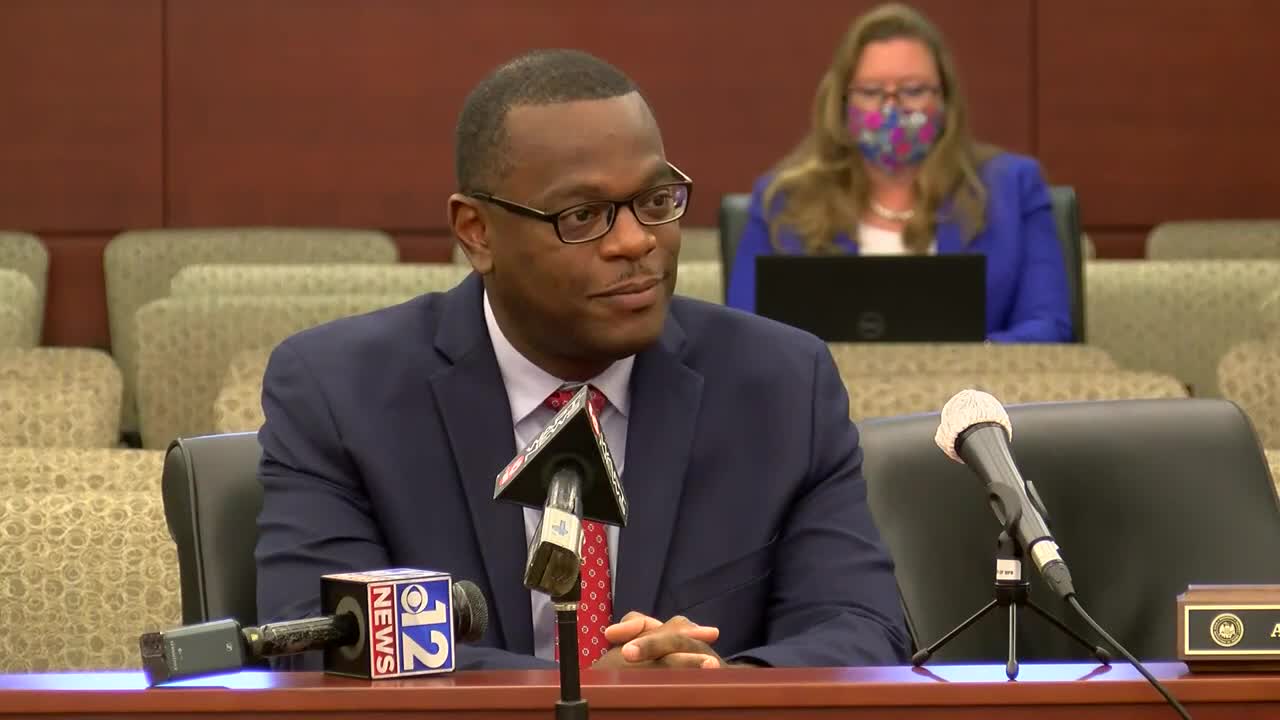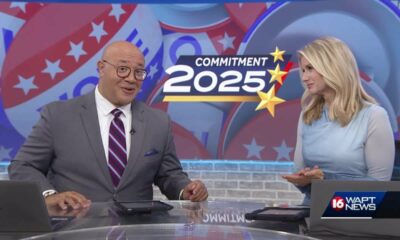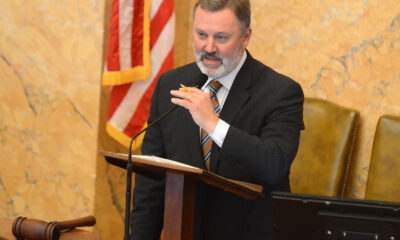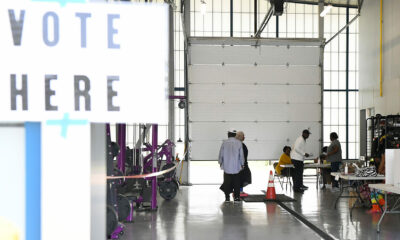Mississippi Today
‘The honeymoon period is over’: JSU faculty senate votes no confidence in president, administration

‘The honeymoon period is over’: JSU faculty senate votes no confidence in president, administration
The Jackson State University faculty senate voted “no-confidence” in President Thomas Hudson and his administration on Thursday.
A two-page resolution from the governing body elected by faculty to represent their concerns called out Hudson and four members of his administration for a “continuous pattern of failing to respect” shared governance and other professional norms of higher education at the historically Black university in Mississippi’s capital city.
Though his tenure has brought JSU athletic success and millions in research dollars, faculty say their concerns have gone ignored for months as Hudson has stopped meeting with them. With the no-confidence vote, years of behind-the-scenes issues – like mold, lax campus security, and worsening pay inequity as high-level administrators have received pay raises – are bubbling into the public eye.
“There are serious issues regarding effective leadership at Jackson State University,” stated the resolution, which also named Joseph Whitaker, the vice president of research and economic development; Michael Bolden, vice president of facilities and operations; Robin Pack, the executive director of human resources, and Brandi Newkirk-Turner, the associate provost.
One faculty senator, at a meeting in August, described the general sentiment toward the administration this way: “The honeymoon period is over, and now the pressure is on.”
At that same meeting, another senator concurred that faculty were starting to feel “like second class citizens.”
In a statement, Hudson said that he is looking forward to working with the faculty senate to address their concerns.
“I’m proud of what my administration has been able to accomplish to date,” Hudson said, “and I am committed to continuing the work to collaboratively execute the strategic plan to make Jackson State the best institution it can be.”
While no-confidence votes signal faculty dissatisfaction with their president, they have no binding effect. Such votes are relatively rare in Mississippi. The most recent was in 2019 after the Institutions of Higher Learning Board of Trustees appointed Glenn Boyce as chancellor at the University of Mississippi. While faculty at Alcorn State University had conce
Hudson was appointed acting president in the wake of a scandal at JSU after former president William Bynum was arrested in a prostitution sting. Hudson, a Jackson resident and JSU alum, had broad support on campus when the IHL board solidified his appointment at the end of 2020.
A few months before Hudson was confirmed by IHL, faculty, noticing that new hires were making more than tenured faculty, started asking his administration to conduct a pay equity study. Black women in particular were increasingly making below the median salary for faculty, according to a data analysis from an Oct. 21 faculty senate meeting.
More than two years later, JSU still hasn’t funded the study. Human resources issued two requests-for-proposals, but the only vendor that replied in 2021 was outside the budget, according to faculty senate meeting minutes. It is unclear how much the university committed to the study.
In April 2022, the provost told the faculty senate they had negotiated the original bid down to $40,000, but that was the last update the senate received on the pay study.
Hudson said in a statement that he is committed to funding the pay equity study and that his administration “has worked extensively with the Faculty and Staff Senate to make it a reality.” He told Mississippi Today that “the pay equity study, it just is what it is. We’re not sure what angle they’re going with the delay.”
For the first year and a half of Hudson’s term, the primary vehicle for faculty to address their concerns with administration was a monthly meeting held by faculty senate leadership. The faculty senate executive committee would talk with Hudson about pressing issues and relay his comments to the senate at large.
But at a meeting with the cabinet on Aug. 23, 2022, Hudson informed the executive committee that it would be his last, according to faculty senate meeting minutes. While the provost would continue to attend, going forward, Hudson wanted “more holistic engagement” with faculty, like town halls. If faculty had concerns, the meeting minutes say that Hudson requested they email other members of the administration and copy him.
Hudson “indicated that he does not think that it’s the best use of his time to go down what is basically a list of concerns every meeting,” the meeting minutes say.
Don Spann, the faculty senate treasurer and a visiting assistant professor, said the executive committee asked Hudson “what do we need to make sure we utilize your time wisely?”
“One of the things he basically said was to make sure it aligns with his strategic plan,” Spann said, adding he felt like Hudson was basically saying, “if it’s not in line with my strategic plan, then I’m not really going to take the time out to listen to it.”
At a faculty senate meeting two days later, faculty expressed concern with Hudson’s request. One senator called town hall meetings “public relation meetings” and another noted that, without changes, faculty “will get frustrated.” One senator said she had a “concern that this format will create a lot of going back and forth and a writing campaign.”
On Sept. 16, the senate sent a letter to Hudson outlining its concerns about the meetings. He never responded, according to the senate.
Emails from faculty senators to administration started to go ignored. They haven’t received an update on the pay equity study in months.
In particular, faculty have repeatedly asked the administration to address what they say is a persistent lack of public safety on campus. Faculty have noted at senate meetings they don’t see security on campus and that there have been car thefts and incidents of homeless people harassing students.
“The campus is too open to strangers,” the Sept. 2022 meeting minutes note.
Spann said that while Bolden has attended faculty senate meetings to talk about facilities and security, he is disappointed with the lack of progress on safety initiatives, like making sure campus cameras are working or hiring new officers.
The Senate shared the resolution with IHL and the commissioner, the staff senate and SGA, and the alumni association. The Clarion Ledger reported that IHL will investigate.
“We want to make the university better as a whole,” Spann said. “In order to do that, you have to have dialogue. But if you’re not at the table with the president, it’s not effective communication at all.”
This article first appeared on Mississippi Today and is republished here under a Creative Commons license.
Mississippi Today
Feuding GOP lawmakers prepare to leave Jackson without a budget, let governor force them back
After months of bitter Republican political infighting, the Legislature appears likely to end its session Wednesday without passing a $7 billion budget to fund state agencies, potentially threatening a government shutdown if they don’t come back and adopt one by June 30.
After the House adjourned Tuesday night, Speaker Jason White said he had presented the Senate with a final offer to extend the session, which would give the two chambers more time to negotiate a budget. As for now, the 100 or so bills that make up the state budget are dead.
The Senate leadership was expected to meet and consider the offer Tuesday evening, White said. But numerous senators both Republican and Democrat said they would oppose such a parliamentary resolution, and Lt. Gov. Delbert Hosemann has also said it’s unlikely and that the governor will have to force lawmakers back into special session.
White said he believes, if the Senate would agree to extend the session and restart negotiations, lawmakers could pass a budget and end the 2025 session by Sunday, only a few days later than planned.
But if the Senate chooses not to pass a resolution extending the session, White said the House would end the session on Wednesday.
It would take a two-thirds vote of support in both chambers to suspend the rules and extend the session. The Senate opposition appears to be enough to prevent that.
Still, the speaker said he believes Lt. Gov. Delbert Hosemann and Senate leaders are considering the proposal. But he said if he doesn’t hear a positive response by Wednesday, the House will adjourn and wait for Gov. Tate Reeves to call a special session at a later date.
“We are open to (extending the session), but we will not stay here until Sunday waiting around to see if they might do it,” White said.
White said leaving the Capitol without a budget and punting the issue to a special session might not cool tensions between the chambers, as some lawmakers hope.
“I think when you leave here and you end up in a special session, some folks say, ‘Well everybody that’s upset will cool down by then.’ They may, or it may get worse. It may shine a different and specific light on some of the things in this budget and the differences in the House and Senate,” White said. “Whereas, I think everybody now is in the legislative mode, and we might get there.”
The Mississippi Constitution does not grant the governor much power, but if Gov. Tate Reeves calls lawmakers into a special session, he gets to set the specific legislative agenda — not lawmakers.
White said the governor could potentially use his executive authority to direct lawmakers to take up other bills, such as those related to education, before getting to the budget.
“When we leave here without a budget, it is entirely the governor’s prerogative to when he (sets a special session) and how he does that.”
While the future of the state’s budget hangs in the balance, lawmakers have spent the remaining days of their regular session trying to pass the few remaining bills that remained alive on their calendars.
House approves DEI ban, Senate could follow suit on Wednesday
The House on Tuesday passed a proposal to ban diversity, equity and inclusion programs from public schools, and both chambers approved a measure to establish a form of early voting.
The House approved a conference report compromise to ban DEI programs and a list of “divisive concepts” from K-12 schools, community colleges and universities. If the Senate follows suit, Mississippi would join a number of other Republican-controlled states and President Donald Trump, who has made rooting DEI out of the federal government one of his top priorities.
The agreement between the Republican-dominated chambers follows hours of heated debate in which Democrats, all almost of whom are Black, excoriated the legislation as a setback in the long struggle to make Mississippi a fairer place for minorities. Legislative Republicans argued the legislation will elevate merit in education and remove from school settings “divisive concepts” that exacerbate divisions among different identity groups.
The concepts that will be rooted out from curricula include the idea that gender identity can be a “subjective sense of self, disconnected from biological reality.” The move reflects another effort to align with the Trump administration, which has declared via executive order that there are only two sexes.
The House and Senate disagreed on how to enforce the act, but ultimately settled on an agreement that would empower students, faculty members and contractors to sue schools for violating the law, but only after they go through an internal campus review process that would give schools time to make changes. The legislation could also withhold state funds from schools that don’t comply.
Legislature sends ‘early voting lite’ bill to governor
The Legislature also overwhelmingly passed a proposal to establish a watered down version of early voting, though the legislation is titled “in-person excused voting,” and not early voting.
The proposal establishes 22 days of in-person voting before Election Day that requires voters to go to the circuit clerk’s office or another location county officials have designated as a secure early voting facility, such as a courtroom or a board of supervisors meeting room.
To cast an early vote, someone must present a valid form of photo ID and list one of about 15 legal excuses to vote before Election Day. The excuses, however, are broad and would, in theory, allow many people to cast early ballots.
Examples of valid excuses are voters expecting to work on Election Day, being at least 65 years old, being currently enrolled in college or potentially travelling outside of their county on Election Day.
Since most eligible voters either work, go to college or are older than 65 years of age, these excuses would apply to almost everyone.
“Even though this isn’t early voting as we saw originally, it makes this more convenient for hard working Mississippians to go by their clerks’ office and vote in person after showing an ID 22 days prior to an election,” Senate Elections Chairman Jeremy England said.
Republican Gov. Tate Reeves opposes early voting, so it’s unclear if he would sign the measure into law or veto it.
Both chambers are expected to gavel at 10 a.m. on Wednesday to debate the final items on their agenda.
This article first appeared on Mississippi Today and is republished here under a Creative Commons license.
Mississippi Today
‘A lot of us are confused’: Lacking info, some Jacksonians go to wrong polling place
Johnny Byrd knew that when his south Jackson neighborhood Carriage Hills changed wards during redistricting last year, his neighbors would have trouble finding their correct polling place on Election Day.
So he bought a poster board and inscribed it with their new voting location – Christ Tabernacle Church.
“I made a sign and placed it in front of the entrance to our neighborhood that told them exactly where to go so there would be no confusion,” said Byrd, vice president of the Association of South Jackson Neighborhoods.
Still, on April 1, a car full of voters from a senior living facility who should have gone to Christ Tabernacle were driven to their old polling place.
“I thought it was unfortunate they had to get there and find out rather than knowing in advance that their polling location was different,” said Sen. Sollie Norwood, a Democrat from Jackson who was on the ground Tuesday helping constituents with voting.
One of those elderly women became frustrated and said she no longer wanted to vote, Norwood said, though her companions tried to convince her otherwise. By midday Tuesday, 300 people had voted at Christ Tabernacle, one of the city’s largest precincts currently in terms of registered voters, but among the lowest in turnout historically.
Voting rights advocates and candidates vying for municipal office in Jackson are keeping an eye on issues facing voters at the polls, though without official results, it remains to be seen if that will dampen turnout this election with the hotly contested Democratic primary.
“I still believed it was gonna be low,” Monica McInnis, a program manager for the nonprofit OneVoice, said of turnout. “I was expecting it would be a little higher because of what is on the ballot and how many people are running in all of the wards as well as the mayor’s race.”
The situation is evolving as the day goes on, but the main issues are twofold. One, thousands of Jackson voters have new precinct locations after redistricting last year put them into a new city council ward.
Two, some voters didn’t realize their polling place for the municipal elections may differ from where they voted in last year’s national elections, which are run by the counties.
In Mississippi, voters are assigned two precincts that are often but not always the same: A municipal location for city elections and a county location for senate, gubernatorial and presidential elections
“People in Mississippi, we go to the same polling location for three years, and that fourth year, it changes,” said Jada Barnes, an organizer with the Jackson-based nonprofit MS Votes. “A lot of us are confused. When people are going to the polling place today, they’re seeing it is closed, so they’re just going back home which is making turnout go even lower.”
Barnes said she’s hearing this primarily from a few Jackson voters who called a hotline that MS Votes is manning. Lack of awareness around polling locations is a big deterrent, she said, because most people are trying to squeeze their vote in between work, school or family responsibilities.
“Maybe you’re on your lunch break, you only got 30 minutes to go vote, you learn that your polling location has changed and now you have to go back to work,” she said.
Norwood said he heard from a group of students assigned to vote at Christ Tabernacle who had attempted to vote at the wrong precinct and were told their names weren’t on the rolls. They didn’t know they had been moved from Ward 4 to Ward 6, Norwood said, meaning they expected to vote in a different council race until reaching the polls Tuesday.
Though voters have a duty to be informed of their polling location, Barnes said city and circuit clerks and local election commissioners are ultimately responsible for making sure voters know where to go on Election Day.
Angela Harris, the Jackson municipal clerk, said her office worked to inform voters by mailing out thousands of letters to Jacksonians whose precincts changed, including the roughly 6,000 whose wards changed during the 2024 redistricting.
“I am over-swamped,” she said yesterday.
Despite her efforts, at least one voter said he never got a letter. Stephen Brown learned through Facebook, not an official notice, that he was moved from Ward 1 to Ward 2.

A resident of the Briarwood Heights neighborhood in northeast Jackson, Brown’s efforts to vote Tuesday have been complicated by mixed messages and a lack of communication. He has yet to vote, even though he showed up at the polls at 7:10 this morning.
His odyssey took him to two wrong locations, where the poll managers instructed Brown to call his ward’s election commissioner, who did not answer multiple calls, Brown said. Brown finally learned through a Facebook comment that he could look up his new precinct on the Mississippi Secretary of State’s website — if he scrolled down the page past his county precinct information.
This afternoon, Brown has a series of meetings planned, so now he’s hoping for a 30-minute window to try voting one more time, even though he’s skeptical it will make a difference.
“I’m a very disenchanted voter, because I’ve been let down so much,” he said. “I vote because it’s the thing that I’m supposed to do and because of the sacrifices of my ancestors, but not because I truly believe in it, you know?”
Brown’s not alone in facing turbulence. Back at Christ Tabernacle, one Jackson voter, who declined to give her name, said she’s frustrated from having to drive to three polling locations in one day.
“I’m dissatisfied with the fact that I had to drive from one end of this street and all of the back to come over here when I usually vote over here on Highway 18,” she said. “This was a great inconvenience, gas wise and time wise.”
The same thing happened to Rodney Miller. He called the confusion some voters are facing in this election “unnecessary.”
“That ain’t the way we should be handling business,” he said. “We should be looking out for one another better than that, you know? It’s already enough getting people out to vote, and when you confuse them when they try? Come on now. That’s discouraging.”
Christ Tabernacle is the second largest precinct in the city in terms of registered voters, with 3,330 assigned to vote there as of 2024, according to documents retrieved from the municipal election committee. But it had one of the lowest voter turnout rates – 10% in the 2021 primary election before redistricting and before it became so large.
Byrd mentioned the much higher turnout in places like Ward 1 in northeast Jackson, compared to where he lives in south Jackson. Why does Byrd think this is?
“Civics,” Byrd said. “They took civics out of school. If you ask the average person what is the role and responsibility of any elected official, they can’t tell you.”
This article first appeared on Mississippi Today and is republished here under a Creative Commons license.![]()
Mississippi Today
New Stage’s ‘Little Women’ musical opens aptly in Women’s History Month
Ties that bind, not lines that divide, at the heart of “Little Women” are what make Louisa May Alcott’s beloved novel such an enduring classic. More than a century and a half since its 1868 publication, the March sisters’ coming-of-age tale continues to resonate in fresh approaches, say cast and crew in a musical version opening this week at New Stage Theatre in Jackson, Mississippi.
“Little Women, The Broadway Musical” adds songs to Alcott’s story of the four distinct March sisters — traditional, lovely Meg, spirited tomboy and writer Jo, quiet and gentle Beth, and artistic, pampered Amy. They are growing into young women under the watchful eye of mother Marmee as their father serves as an Army chaplain in the Civil War. “Little Women, The Broadway Musical” performances run March 25 through April 6 at New Stage Theatre.
In a serendipitous move, the production coincides with Women’s History Month in March, and has a female director at the helm — Malaika Quarterman, in her New Stage Theatre directing debut. Logistics and scheduling preferences landed the musical in March, to catch school matinees with the American classic.
The novel has inspired myriad adaptations in film, TV, stage and opera, plus literary retellings by other authors. This musical version debuted on Broadway in 2005, with music by Jason Howland, lyrics by Mindi Dickstein and book (script) by Allan Knee.
“The music in this show brings out the heart of the characters in a way that a movie or a straight play, or even the book, can’t do,” said Cameron Vipperman, whose play-within-a-play role helps illustrate the writer Jo’s growth in the story. She read the book at age 10, and now embraces how the musical dramatizes, speeds up and reconstructs the timeline for more interest and engagement.
“What a great way to introduce kids that haven’t read the book,” director Quarterman said, hitting the highlights and sending them to the pages for a deeper dive on characters they fell in love with over the two-and-a-half-hour run time.

Joy, familial warmth, love, courage, loss, grief and resilience are all threads in a story that has captivated generations and continues to find new audiences and fresh acclaim (the 2019 film adaptation by Greta Gerwig earned six Academy Award nominations).
In current contentious times, when diversity, equity and inclusion programs are being ripped out or rolled back, the poignant, women-centered narrative maintains a power to reach deep and unite.
“Stories where females support each other, instead of rip each other apart to get to the finish line — which would be the goal of getting the man or something — are very few and far between sometimes,” Quarterman said. “It’s so special because it was written so long ago, with the writer being such a strong dreamer, and dreaming big for women.
“For us to actualize it, where a female artistic producer chooses this show and believes in a brand new female director and then this person gets to empower these great, local, awesome artists — It’s just really been special to see this story and its impact ripple through generations of dreamers.” For Quarterman, a 14-year drama teacher with Jackson Public Schools active in community theater and professional regional theater, “To be able to tell this story here, for New Stage, is pretty epic for me.”
Alcott’s story is often a touchstone for young girls, and this cast of grown women finds much in the source material that they still hold dear, and that resonates in new ways.

“I relate to Jo more than any other fictional character that exists,” Kristina Swearingen said of her character, the central figure Jo March. “At different parts of my life, I have related to her in different parts of hers.”
The Alabama native, more recently of New York, recalled her “energetic, crazy, running-around-having-a-grand-old-time” youth in high school and college, then a career-driven purpose that led her, like Jo, to move to New York.
Swearingen first did this show in college, before the loss of grandparents and a major move. Now, “I know what it’s like to grieve the loss of a loved one, and to live so far away from home, and wanting to go home and be with your family but also wanting to be in a place where your career can take off. .. It hits a lot closer to home.”
As one of four sisters in real life, Frannie Dean of Flora draws on a wealth of memories in playing Beth — including her own family position as next to the youngest of the girls. She and siblings read the story together in their homeschooled childhood, assigning each other roles.

“Omigosh, this is my life,” she said, chuckling. “We would play pretend all day. … ‘Little Women’ is really sweet in that aspect, to really be able to carry my own experience with my family and bring it into the show. … It’s timeless in its nature, its warmth and what it brings to people.”
Jennifer Smith of Clinton, as March family matriarch Marmee, found her way in through a song. First introduced to Marmee’s song “Here Alone” a decade ago when starting voice lessons as an adult, she made it her own. “It became an audition piece for me. It became a dream role for me. It’s been pivotal in opening up doors for me.”
She relishes aging into this role, countering a common fear of women in the entertainment field that they may “age out” of desirable parts. “It’s just a full-circle moment for me, and I’m grateful for it.”

Quarterman fell in love with the 1969 film version she watched with her sister when they were little, adoring the family’s playfulness and stability. Amid teenage angst, she identified with the inevitable growth and change that came with siblings growing up and moving on. Being a mom brings a whole different lens.
“Seeing these little people in your life just growing up, being their own unique versions, all going through their own arc — it’s just fun, and I think that’s why you can stay connected” to the story at any life juncture, she said.
Cast member Slade Haney pointed out the rarity of a story set on a Northeastern homestead during the Civil War.
“You’re getting to see what it was like for the women whose husbands were away at war — how moms struggled, how sisters struggled. You had to make your own means. … I think both men and women can see themselves in these characters, in wanting to be independent like Jo, or like Amy wanting to have something of value that belongs to you and not just just feel like you’re passed over all the time, and Meg, to be valuable to someone else, and in Beth, for everyone to be happy and content and love each other,” Haney said.
New Stage Theatre Artistic Director Francine Reynolds drew attention, too, to the rarity of an American classic for the stage offering an abundance of women’s roles that can showcase Jackson metro’s talent pool. “We just always have so many great women,” she said, and classics — “To Kill a Mockingbird” and “Death of a Salesman,” for instance — often offer fewer parts for them, though contemporary dramas are more balanced.
Reynolds sees value in the musical’s timing and storyline. “Of course, we need to celebrate the contributions of women. This was a woman who was trying to be a writer in 1865, ’66, ’67. That’s, to me, a real trailblazing thing.
“It is important to show, this was a real person — Louisa May Alcott, personified as Jo. It’s important to hold these people up as role models for other young girls, to show that you can do this, too. You can dream your dream. You can strive to break boundaries.”
It is a key reminder of advancements that may be threatened. “We’ve made such strides,” Reynolds said, “and had so many great programs to open doors for people, that I feel like those doors are going to start closing, just because of things you are allowed to say and things you aren’t allowed.”
For tickets, $50 (discounts for seniors, students, military), visit www.newstagetheatre.com or the New Stage Theatre box office, or call 601-948-3533.
This article first appeared on Mississippi Today and is republished here under a Creative Commons license.![]()
-

 News from the South - Florida News Feed6 days ago
News from the South - Florida News Feed6 days agoFamily mourns death of 10-year-old Xavier Williams
-

 News from the South - Alabama News Feed7 days ago
News from the South - Alabama News Feed7 days ago1 Dead, Officer and Bystander Hurt in Shootout | March 25, 2025 | News 19 at 9 p.m.
-

 News from the South - Alabama News Feed5 days ago
News from the South - Alabama News Feed5 days agoSevere storms will impact Alabama this weekend. Damaging winds, hail, and a tornado threat are al…
-

 News from the South - Alabama News Feed4 days ago
News from the South - Alabama News Feed4 days agoUniversity of Alabama student detained by ICE moved to Louisiana
-

 News from the South - Louisiana News Feed6 days ago
News from the South - Louisiana News Feed6 days agoSeafood testers find Shreveport restaurants deceiving customers with foreign shrimp
-

 News from the South - Oklahoma News Feed7 days ago
News from the South - Oklahoma News Feed7 days agoWhy are Oklahomans smelling smoke Wednesday morning?
-

 News from the South - Oklahoma News Feed3 days ago
News from the South - Oklahoma News Feed3 days agoTornado watch, severe thunderstorm warnings issued for Oklahoma
-

 News from the South - West Virginia News Feed6 days ago
News from the South - West Virginia News Feed6 days agoRoane County Schools installing security film on windows to protect students















































